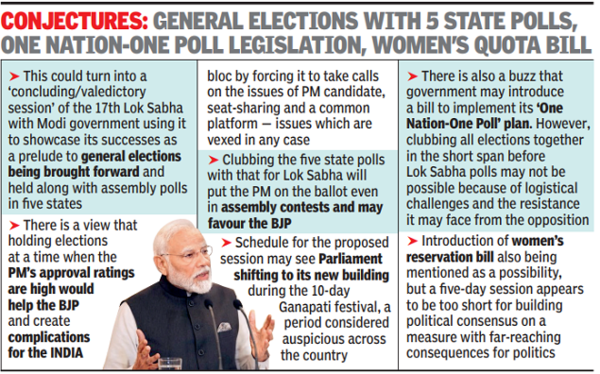“Special session of Parliament (13th session of 17th Lok Sabha and 261st session of Rajya Sabha) is being called from September 18 to 22 having five sittings. Amrit Kaal is looking forward to having fruitful discussions and debate in Parliament,” parliamentary affairs minister Pralhad Joshi said on X, previously called Twitter.
The government was tight-lipped about the likely agenda for the session, being held just over a month after the monsoon session ended on August 11, deepening the mystery behind the move. Even senior government functionaries struggled to define the purpose. The INDIA bloc termed the move an attempt to divert attention from their unity efforts and the fresh allegations on the Adani group, but were unable to fathom the motive.
Significantly, the government appeared to have thought through the move to hold the session, to be held a day after PM Modi’s birthday, with strong indications that senior government functionaries have been asked to cancel any foreign trip that might clash with the session.
The announcement tied in with the assessment in government circles about the possibility of Lok Sabha elections bring advanced from April-May to be clubbed with elections in Madhya Pradesh, Rajasthan, Chhattisgarh, Telangana and Mizoram. Although sources lacked clarity about the political rationale for holding the session in September, two months ahead of the winter session which is convened in November, they felt that going to polls early would make political sense for the BJP.
A few political quarters also speculated about the plan for passage of big legislations like ‘One Nation-One Poll’ and one-third reservation for women in legislatures being the likely reasons for the five-day sitting, but senior sources weighed against the possibility, citing reasons from logistical constraints to political divisions.
Although a majority government is not dependent on Parliament’s consent to hold early election and dissolve Lok Sabha, the five-day session could showcase its achievements and set the tone for its campaign for a third term for Modi as PM.
In 2004, the then BJP government led by Atal Bihari Vajpayee had called early elections. The gambit, however, did not pay off and was identified as one of the contributory factors behind its shock defeat. Saffron strategists, however, feel that they are well prepared this time for hitting the hustings. The Modi government’s approval ratings are high and the successful implementation of an entire raft of welfare schemes would ensure that the opposition would not be able to pick openings like it did when it turned the Vajpayee government’s “India Shining” campaign to successfully cast it as pro-rich.
High growth rate, rise to the fifth spot in global economy, effective fight against the pandemic, free ration and other welfare measures along with high-visibility moments like the Chandrayaan-3 mission add up to an effective plank which is certain to highlight the growing geopolitical heft, said a BJP source. An early election could complicate matters for the INDIA bloc by forcing it to speed up its responses to tasks like settling on a PM face and hammering out seat-sharing arrangement among other parties which are still partners in regional theatres: tasks which would have, in any case, have been difficult.
Sources said the government also has to guard against Black Swan moments like the pandemic or a geopolitical confrontation like the one over Ukraine which has resulted in rise in prices of food and fertilisers. The poor monsoon, the collapse of the Black Sea grain deal resulting in stoppage of export of wheat from Ukraine, persistent inflation and the sharp slowdown in China underline the risks posed by “global shocks”, said a government functionary who has been engaged in deliberations over important policy decisions.
There is a strong possibility of the five-day sitting being held in the new building of Parliament. If this happens, the shift from the colonial-era building to the new one inaugurated by the PM will happen during the Ganesh Chaturthi celebrations — an auspicious spell for people almost across the country.
The Modi government has long favoured clubbing elections, a stance which reflects the widespread lament that going back to the system where, until 1967, Lok Sabha and assembly elections were largely held simultaneously, will spare the country resources and energy and the long spells of “administrative paralysis” necessitated by the model code of conduct. The idea has remained on paper because of several reasons, ranging from the fear of the opposition that synchronising elections will work to the advantage of a Modi-led BJP, the difficulty of persuading political parties to agree to the dissolution of governments which are far from completing their term and the Herculean logistical tasks.
The goal for reserving one-third of seats in legislatures for women can be achieved by Parliament but a five-day session, that too, in the lead-up to assembly and Lok Sabha polls, may not be easy.
The last time Parliament had met outside its three usual sessions was on the midnight of June 30, 2017, to mark the rollout of GST. However, it was a joint sitting of Lok Sabha and Rajya Sabha, and was not a proper session as is the case this time with both Houses assembling. A six-day special sitting was held in August 1997 to commemorate the 50th anniversary of India’s independence.
Midnight sessions were also held on August 9, 1992, for the 50th anniversary of Quit India Movement, August 14-15, 1972, to celebrate the silver jubilee of India’s independence, while the first such session was on August 14-15, 1947 on the eve of India’s independence.
Watch Government announces Special Session of Parliament from September 18-22
